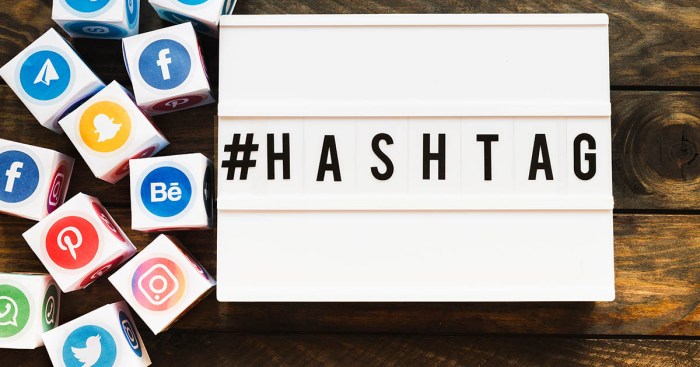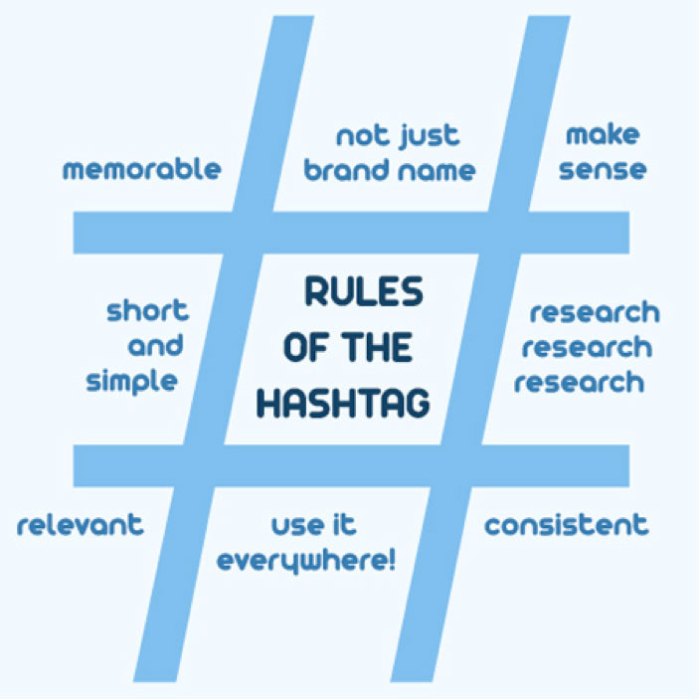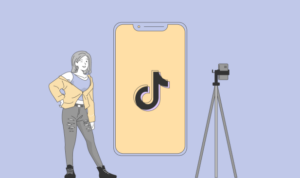Using Hashtags Effectively is like the secret sauce of social media success – it can make or break your online game. Dive into this guide filled with tips, tricks, and real-life examples to level up your hashtag game!
Introduction to Using Hashtags Effectively

Hashtags are a powerful tool used on social media platforms to categorize content and make it more discoverable. By adding a hashtag symbol (#) before a word or phrase, users can easily search for and find related posts.
Using hashtags strategically in online content is crucial for increasing visibility and engagement. They help to reach a wider audience, connect with like-minded individuals, and boost overall engagement on posts.
Examples of Popular Hashtags and Their Impact
- #ThrowbackThursday – This hashtag is commonly used to share nostalgic photos or memories from the past. It encourages engagement by prompting users to reminisce and share their own throwback moments.
- #MotivationMonday – A popular hashtag to kickstart the week with positive quotes, encouragement, and motivational content. It can inspire and uplift followers, leading to increased interaction and shares.
- #Foodie – Ideal for food lovers, this hashtag is used to share delicious dishes, recipes, and restaurant experiences. It creates a sense of community among food enthusiasts and attracts food-related brands and influencers.
Types of Hashtags
When it comes to hashtags, there are several different types that serve unique purposes in social media marketing. Let’s dive into the various categories of hashtags and how they can be effectively utilized to boost engagement and reach.
Trending Hashtags
Trending hashtags are topics or phrases that are currently popular on social media platforms. By incorporating trending hashtags into your posts, you can increase visibility and join conversations that are already happening online. For example, during major events like the Super Bowl or award shows, using relevant trending hashtags can help your content reach a wider audience.
Branded Hashtags
Branded hashtags are unique to a specific brand or company. They are used to promote brand awareness, encourage user-generated content, and foster a sense of community among followers. For instance, Coca-Cola’s #ShareACoke campaign encouraged consumers to share photos of personalized Coke bottles with the branded hashtag, generating widespread engagement and user participation.
Community Hashtags
Community hashtags are used to connect with a specific group of people with shared interests or affiliations. These hashtags help build communities, facilitate discussions, and create a sense of belonging among like-minded individuals. An example of a community hashtag is #Bookstagram, which is commonly used by book lovers to share their reading recommendations and connect with fellow bibliophiles.
Campaign-Specific Hashtags
Campaign-specific hashtags are created for a particular marketing campaign or initiative. These hashtags are often used to track the success of a campaign, encourage participation, and create buzz around a specific event or promotion. A successful example is the #IceBucketChallenge campaign, which went viral on social media and raised awareness and funds for ALS research.
Best Practices for Using Hashtags
When it comes to using hashtags effectively, there are certain best practices to keep in mind in order to maximize visibility and engagement on social media platforms.
Researching and Choosing Relevant Hashtags
Researching and choosing relevant hashtags is crucial to reaching your target audience and increasing the visibility of your posts. Here are some tips to help you with this process:
- Understand your target audience: Research the interests and trending topics within your target audience to identify relevant hashtags.
- Use hashtag tools: Utilize online tools and platforms to discover popular and related hashtags for your content.
- Check out competitors: Look at what hashtags your competitors are using successfully and consider incorporating some of them into your strategy.
Optimal Number of Hashtags
Determining the optimal number of hashtags to use in a post can impact its visibility and engagement. While the ideal number may vary across platforms, here are some general guidelines to consider:
- Instagram: Aim for 11-30 hashtags per post to maximize reach.
- Twitter: Limit your hashtags to 1-2 per tweet to avoid clutter and maintain readability.
- Facebook: Keep it concise with 1-2 relevant hashtags to complement your content.
Tracking Performance and Adjusting Strategies
Tracking the performance of your hashtags is essential to understanding their effectiveness and making necessary adjustments to your strategy. Here’s how you can monitor and optimize your hashtag usage:
- Use analytics tools: Take advantage of built-in analytics tools on social media platforms to track the performance of your hashtags.
- Monitor engagement: Keep an eye on likes, comments, shares, and other interactions to gauge the impact of your hashtags.
- Experiment and adjust: Test different hashtags, analyze their performance, and make adjustments based on the results to optimize your strategy.
Hashtag Etiquette and Mistakes to Avoid

Using hashtags on social media can be a powerful tool to increase visibility and engagement. However, it’s essential to understand the do’s and don’ts to avoid common mistakes that can hinder your social media strategy.
Overusing Hashtags
- Avoid using too many hashtags in a single post as it can make your content look spammy and reduce its credibility.
- Stick to 2-5 relevant hashtags per post to maintain a clean and professional appearance.
- Overloading your posts with hashtags can also dilute your message and make it harder for users to engage with your content.
Using Irrelevant Hashtags
- Make sure the hashtags you use are directly related to the content of your post.
- Using popular but irrelevant hashtags may attract the wrong audience and decrease the engagement of your posts.
- Ensure that the hashtags you choose accurately reflect the topic or theme of your content.
Not Researching Hashtags
- Before using a hashtag, research its meaning, popularity, and relevance to avoid any unintended consequences.
- Some hashtags may have double meanings or be associated with controversial topics, so it’s crucial to do your homework.
- Using trending hashtags without understanding their context can lead to backlash and damage your brand’s reputation.
Ignoring Hashtag Trends
- Stay updated on the latest hashtag trends within your industry or niche to capitalize on popular topics and conversations.
- Using outdated or irrelevant hashtags can make your content seem out of touch and decrease engagement.
- Engaging with current trends shows that your brand is active and relevant in the online community.
Tools for Managing Hashtags
Hashtags are a powerful tool for increasing visibility and engagement on social media platforms. However, managing hashtags effectively can be a time-consuming task. Fortunately, there are several tools and software available that can help simplify the process of hashtag research, tracking, and analysis.
1. Hashtagify
Hashtagify is a popular tool for hashtag research that allows users to discover the top hashtags related to a specific or topic. It provides valuable insights into hashtag trends, popularity, and influencers using specific hashtags.
2. RiteTag, Using Hashtags Effectively
RiteTag is another useful tool for managing hashtags that provides real-time analytics on the performance of hashtags. It offers suggestions for relevant hashtags based on engagement levels, helping users choose the most effective hashtags for their posts.
3. Sprout Social
Sprout Social is a comprehensive social media management platform that includes features for hashtag tracking and analysis. It allows users to monitor the performance of hashtags across different social media channels and provides data-driven insights to optimize hashtag strategies.
4. Keyhole
Keyhole is a hashtag tracking tool that offers real-time data on hashtag performance, reach, and engagement. It helps users track the impact of their hashtag campaigns and identify trends to improve their social media strategy.
These tools can help streamline the process of using hashtags effectively by providing valuable insights, suggestions, and analytics to optimize hashtag strategies and maximize engagement on social media platforms.
Case Studies of Successful Hashtag Campaigns: Using Hashtags Effectively
Hashtags have become a powerful tool for brands to increase engagement and create brand awareness on social media platforms. Let’s take a look at some successful case studies of brands that effectively leveraged hashtags to drive their marketing campaigns.
Nike – #JustDoIt
- Nike’s iconic hashtag #JustDoIt has been a staple in their marketing campaigns for years. It encourages individuals to push their limits and strive for greatness.
- The strategy behind this campaign was to inspire and motivate their audience to take action and pursue their goals, aligning perfectly with Nike’s brand ethos of athleticism and empowerment.
- The impact of the #JustDoIt campaign was immense, with millions of social media users sharing their personal stories of triumph and perseverance using the hashtag.
Coca-Cola – #ShareACoke
- Coca-Cola’s #ShareACoke campaign was a massive success, allowing customers to personalize their Coke bottles with their names or messages.
- The strategy behind this campaign was to create a sense of personal connection and community among Coca-Cola consumers, driving engagement and brand loyalty.
- The impact of the #ShareACoke campaign was widespread, with social media users sharing photos of their personalized bottles and generating buzz around the brand.
Starbucks – #RedCupContest
- Starbucks launched the #RedCupContest during the holiday season, encouraging customers to share creative photos of their festive Starbucks cups for a chance to win prizes.
- The strategy behind this campaign was to foster user-generated content and increase brand engagement during a key sales period for the company.
- The impact of the #RedCupContest was significant, with Starbucks fans eagerly participating in the contest and spreading holiday cheer across social media platforms.

